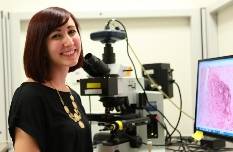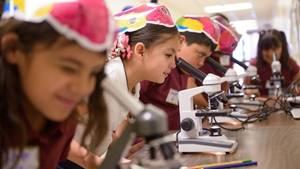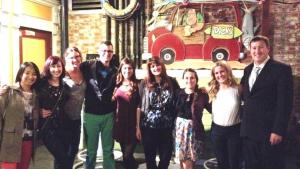
Behavioral Neuroscience of Menopause, Memory, & Aging Lab
Bimonte-Nelson Laboratory
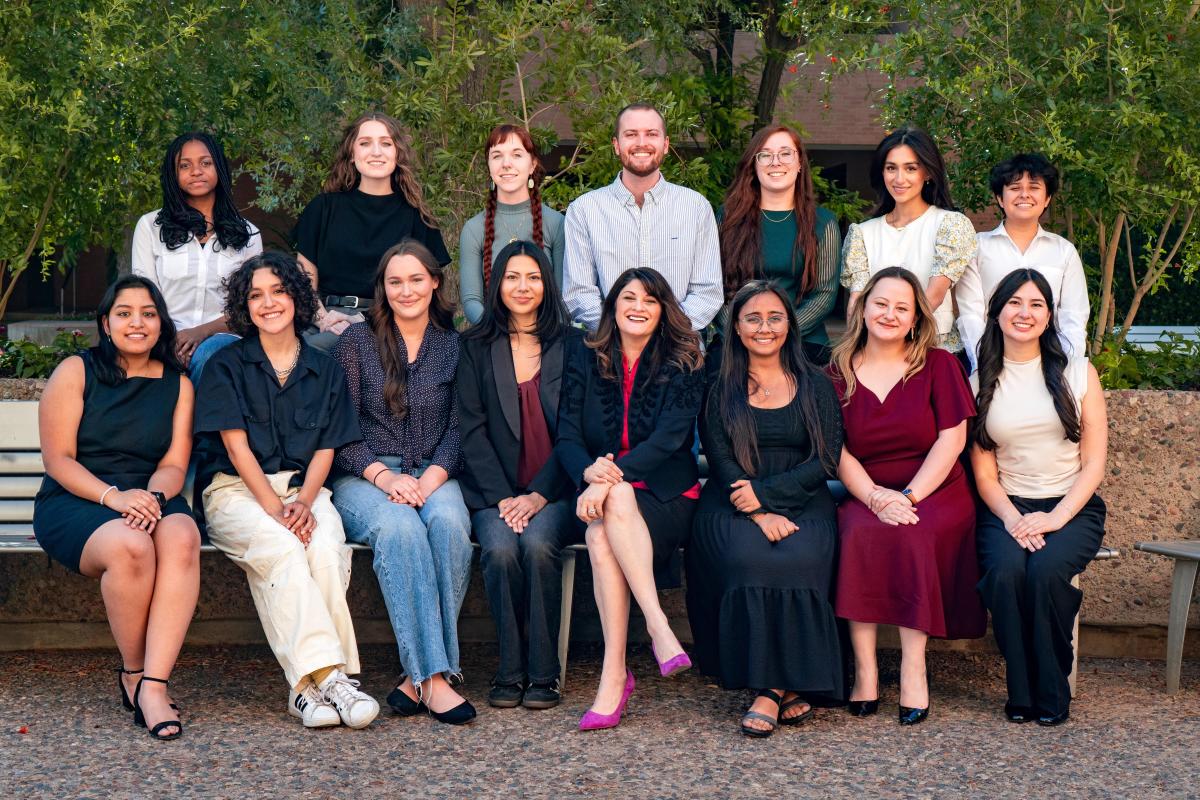
Bimonte-Nelson Lab, 2025
Empowered. Team-oriented. Driven by Discovery.
Brilliant, motivated, and creative student scientists advancing female health through bold, collaborative innovation. Together, we are pushing the boundaries of science — fighting for discovery and a healthier future for women.
The research goals of our laboratory are to characterize the cognitive and brain changes that occur during aging, as well as to develop behavioral and pharmacological strategies to attenuate mnemonic and neurobiological age-related alterations. Towards this goal, one of our primary interests is to determine the roles that sex, hormones, and brain chemistry play in brain function and cognition in young versus aged subjects. Our interests incorporate these goals with relevance to Alzheimer’s disease-related variables, and non-pharmacological approaches to protecting the brain and cognition against age- and neurodegenerative- related changes.
One of our main aims is to determine the effects that hormone therapies used in women have on the brain and its function across the lifespan. For example, we have been studying the effects of Premarin, estradiol, and progestins on cognition and neurobiology in different types of menopause. We are also evaluating hormones in contraceptives for effects on the brain and cognition across the lifespan. Findings demonstrate that estrogen and progesterone can have divergent effects on memory and neurobiology in aging females, and that effects of ovarian hormone loss and replacement are impacted by many parameters including menopause history, temporal specifics, and age.
Donate to support women's health research, through our Bimonte-Nelson Behavioral Neuroscience of Menopause, Memory, & Aging Lab!
If you would like to make a donation to our lab, please click the button below. Even small contributions are a tremendous help when it comes to supporting our research and student scientists, who are our future generation of scientists and physicians. Thus, supporting our research also means supporting the amazing students who work so hard to collect, analyze, and present the research findings. Thank you for considering supporting our menopause work and our students!
Your financial support may be considered a charitable contribution and all donations will be processed by the ASU Foundation for A New American University, a non-profit organization that exists to support Arizona State University (ASU). Your contribution to the Bimonte-Nelson Behavioral Neuroscience of Menopause, Memory, & Aging Lab is greatly appreciated!
Bimonte-Nelson Training Events and Lab Students Collecting Data in the Laboratory, Engaging in Lab Meeting, and Presenting Data:
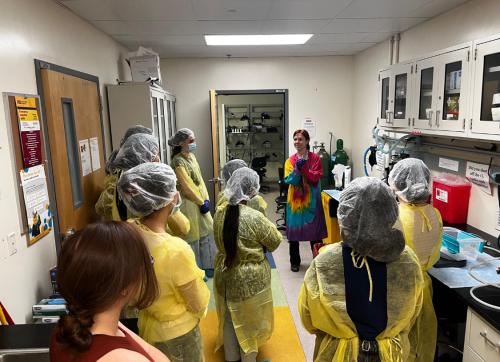
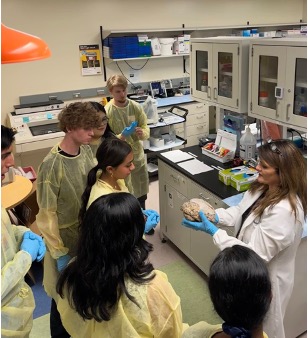
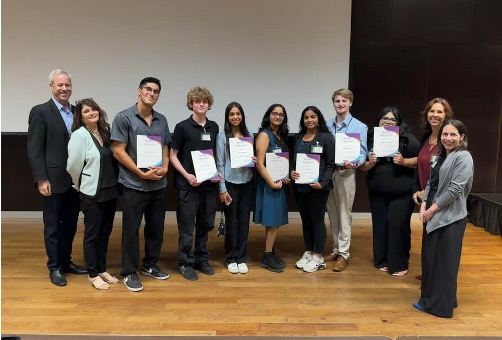
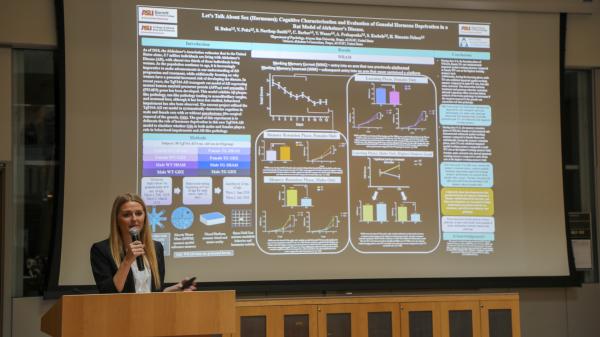
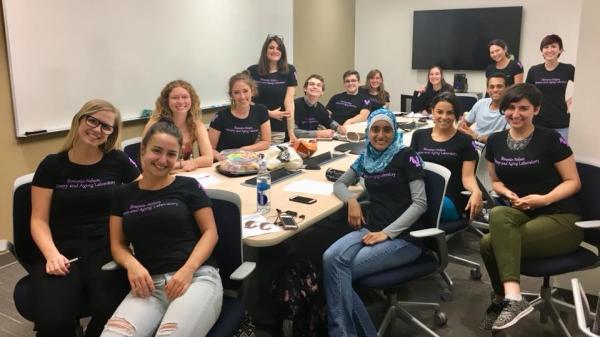
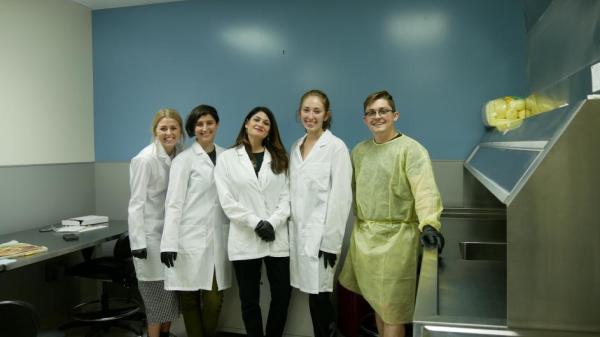
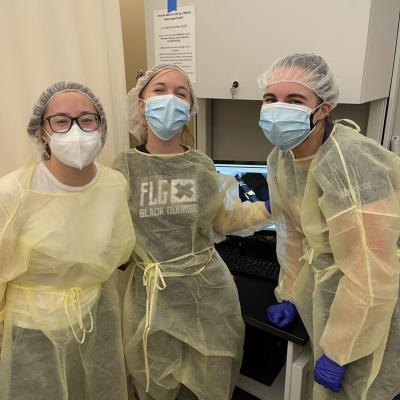
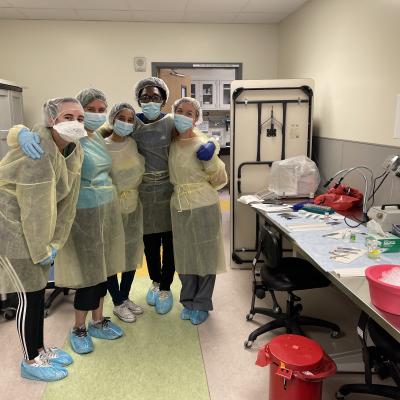
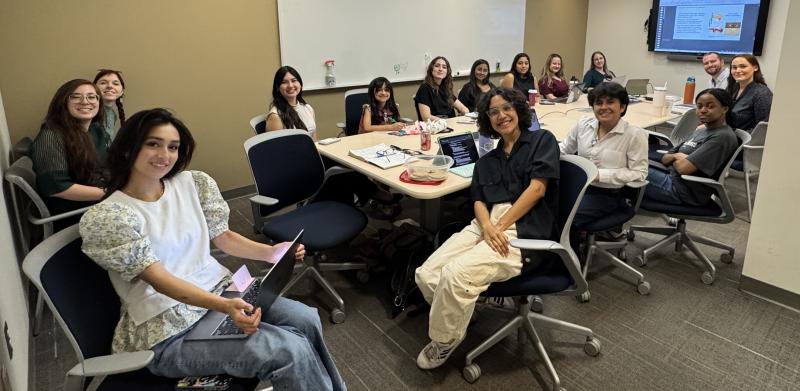
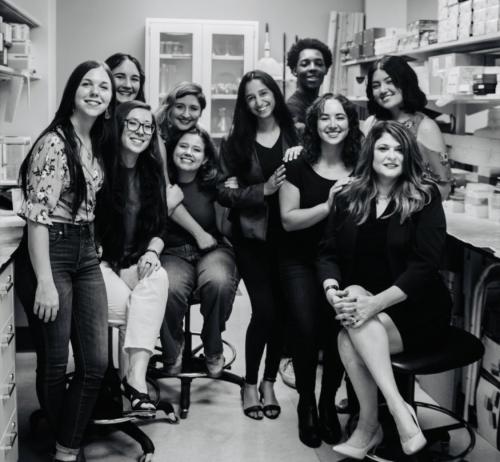
Lab Director and Principal Investigator, President's Professor, Heather Bimonte-Nelson, PhD
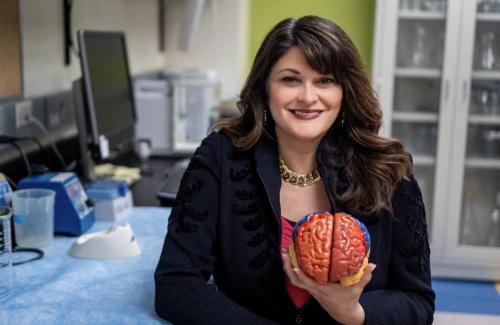
Dr. Bimonte-Nelson's undergraduate degree in Psychology was earned at Richard Stockton College, located near the beach in Pomona, NJ. To follow her interests in brain and behavior, she began her doctoral research under the mentorship of Dr. Victor Denenberg at the University of Connecticut where she focused on sex differences in brain morphology and function, and how ovarian hormones affect the expression of sex differences in an activational and organizational fashion. The idea that gonadal hormones could have such a profound influence on the brain and behavior was intriguing to her and this area of work became her passion. After earning her PhD in 2000, she began a postdoctoral fellowship with Dr. Ann-Charlotte Granholm at the University of Colorado Health Sciences Center in Denver, and several months later, helped move the laboratory to the Medical University of South Carolina. In 2005, Dr. Bimonte-Nelson moved to ASU and founded the Bimonte-Nelson Memory and Aging Laboratory. When Dr. Bimonte-Nelson is not in the laboratory or teaching, she enjoys the beautiful Arizona atmosphere by spending time outdoors with her husband, Matt, and their two children. She also enjoys painting, music, concerts, and writing short stories.
Doctoral Students

Camryn Rae Lizik, Doctoral Student: Hello, I am a fourth-year graduate student in Behavioral Neuroscience and Comparative Psychology PhD program. I joined the Bimonte-Nelson Laboratory as an undergraduate at ASU while completing a BS in Biological Sciences (Neurobiology, Physiology and Behavior) and BA in Global Health. Under the mentorship of Dr. Bimonte-Nelson, I now study system-wide physiological and behavioral changes after ovariectomy and hysterectomy, and explore how these factors impact cognition across the lifespan. I look forward to further exploring how immune and cardiovascular factors act on brain health and function.
Matthew Oevermann, Doctoral Student: I graduated from Southwestern University in 2021 with a BS in Psychology. During my time at Southwestern, I began research in the undergraduate lab of Dr. Fay Guarraci, where I studied the impact of drugs of abuse on female sexual behavior and motivation. After graduation, I worked in the Behavioral Neuropharmacology Laboratory as a laboratory technician, under the supervision of Dr. Rick Bevins, assisting with basic lab management and maintenance while supporting research projects relating to contraceptive hormones on nicotine use. This previous experience led me to the Behavioral Neuroscience PhD program at ASU, where I am now Dr. Heather Bimonte-Nelson’s third-year doctoral student. My research interests broadly include the impacts of sex hormones, reproductive experiences, and aging on cognition.

Lab Manager

Rhys Doyle: I graduated from ASU with a BS in Neuroscience and a BS in Psychology with a minor in Anthropology in May 2025. Within the Bimonte-Nelson Lab and the Newbern Lab, I work on a collaborative project regarding cognitive and memory deficits associated with menopause. Future forward, I seek to contribute to the improvement of care standards and research landscapes of neuroscience and women’s health. Contact: [email protected]
Undergraduate Students
Kamdi Anyigbo: I am a senior majoring in Psychology at Barrett, the Honors College. I was raised in Lagos, Nigeria, and moved to Arizona in 2021. I joined this lab because of the supportive environment and the opportunity to do great, hands-on work. I have gained a lot of knowledge about women’s health and behavioral neuroscience, as well as a lot of useful skills for a research career. I hope to attend graduate school for a PhD in neuroscience. I am very grateful for my time in this awesome lab and am excited to continue learning from lab members and the leadership team!

Sierra Corbin: Hello! I am a senior majoring in Biological Sciences with a minor in Gender, Women, and Sexuality Studies at Barrett, The Honors College. I’m from Dallas, Texas, but I was born in Seattle, Washington. My interests center on the influence of the reproductive system on cognitive function. I plan to attend medical school and pursue a career as a physician specializing in women’s health. I am so grateful to be part of this incredible team and excited to continue learning!
Marisa Hannahs: I am a senior undergraduate student from Arizona, majoring in Biomedical Sciences with a minor in Music. I became involved in the lab after being inspired by the potential of research in this field to enhance the well-being of individuals worldwide. Looking ahead, I aspire to attend medical school, where I can continue to contribute to advancing healthcare and making a meaningful difference in the lives of others. I am incredibly grateful for the opportunity to learn from and collaborate with the talented members of the lab, and I am excited to expand my knowledge of behavioral neuroscience and research.

Samantha Kalas: Born and raised in Arizona, I am a senior pursuing a Bachelor of Science in Psychology. I have strong interests in behavioral neuroscience and health psychology, and I am interested in graduate school and further research for Neuroscience. I joined the lab in fall of 2024, and I look forward to further learning about the research of memory, the female reproductive system, and the brain-uterus connection!
Zamira Diaz: I am a junior at Barrett the Honors College, double majoring in Neuroscience and Psychology. I joined this lab in the spring semester of my freshman year after exploring different research opportunities and found the perfect match both for my research interests and team whose passion was as genuine and deep as my own. I am incredibly grateful to work in a lab that not only conducts meaningful research but also fosters a supportive, uplifting, and talented team. My research interests focus on memory and addressing long-standing disparities in research by studying underrepresented minorities including women and people of color. I am deeply committed to contributing to equity in this field through research and advocacy. After completing my undergraduate degrees, I will be pursuing a PhD and continuing a career in research.


Ishmeet Kaur: Hello, I’m an international student from India. I am currently a junior majoring in neuroscience with a minor in psychology. I plan to pursue a PhD and build a career in research. I’m especially interested in studying memory and aging and exploring how they impact brain function. Being part of this lab is a great opportunity, and I’m excited to learn and grow as a researcher.
Angela Garayzar Lopez: I am a second-year Neuroscience student at Barrett, the Honors College. I have been with the BN lab for a semester now, and I am very excited to get myself involved in research! I’ve always been fascinated by the inner workings of the brain, and am passionate about learning how it works together with the reproductive system.With this in mind, I truly believe that our research is incredibly valuable toward broadening the knowledge surrounding women’s health and why it is so important to consider its connection to neurodegenerative diseases.


Isa Gonzalez-Cruz: I am a sophmore undergraduate student pursuing a double major in psychological science and neuroscience at Barrett, the Honors College. I was born in Pennsylvania, but I have lived in Colorado, California, and now Arizona! I joined the lab in Fall of 2024, and my research interests include how sex differences and hormones can affect different functions of the brain. I am hoping to pursue graduate school and research in the future as well.
Highschool Students
Varshini Vijayaraghavan: I am a native Arizona junior at Hamilton High School interested in pursuing psychology and neuroscience in undergraduate college. I have joined the lab to deepen my understanding and expand my knowledge in behavioral neuroscience, physiology, and behavior, particularly in aging and memory function. My long-term goals include attending medical school and earning a PhD in neuroscience. I am thrilled to collaborate with undergraduate and graduate students in the lab and am eager to contribute meaningfully to scientific research.
Undergraduate Research Assistants (white lab coats) with Graduate Students (colorful lab coats), 2025
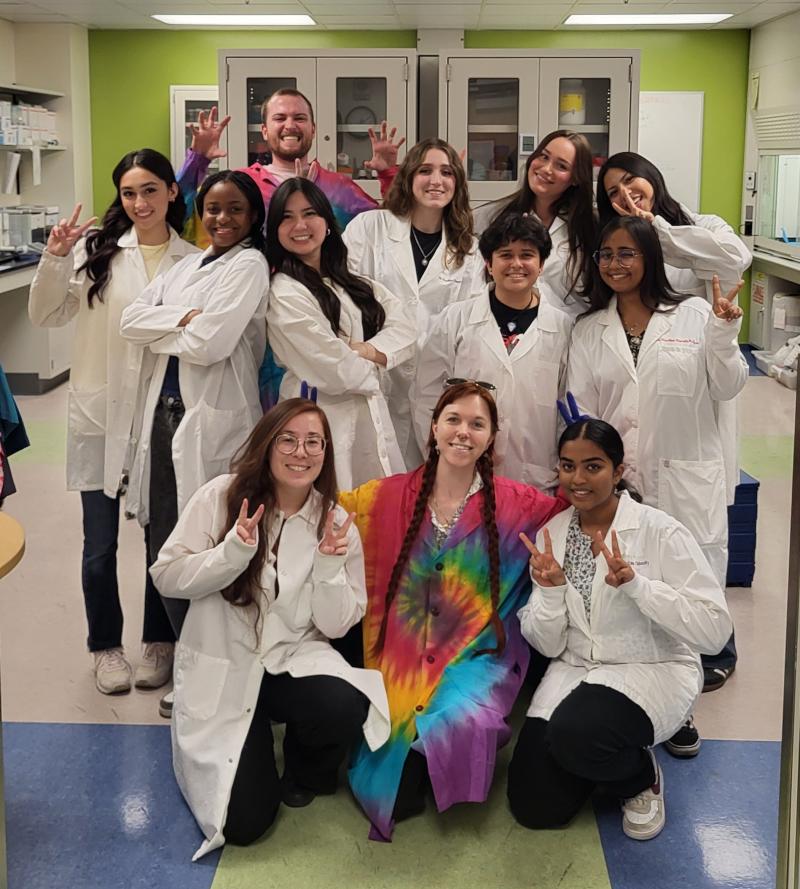
Where are they now?
Joshua Talboom (2011, PhD) - currently a Post-doc at Translational Genomics Research Institute (TGEN)
B. Blair Braden (2012, PhD) - currently an Associate Professor in the Department of Speech and Hearing Sciences at Arizona State University
Jazmin Acosta (2013, PhD & Post-doctoral fellow) - currently an Associate Medical Science Liaison, Medical Affairs at Kythera Biopharmaceuticals, Inc.
Elizabeth Engler-Chiurazzi (2013, PhD) - currently an Assistant Professor at Tulane in the Neurosurgery Department
Sarah Mennenga (2015, PhD) – currently pursuing a Post-Doc at New York University
Mari Willeman (2018, Post-doctoral fellow) - currently faculty at Glendale Community College
Alesia Prakapenka (2018, PhD) - currently pursuing a Post-doc at Syracuse University
Stephanie Koebele (2019, PhD) - currently pursuing a Post-doc at Arizona State University
Victoria Bernaud (2022, PhD) - currently at Phoenix Children's Hospital as a scientific writer
Veronica Pena (2023, PhD) - currently a Neuroscience Professor at Arizona State University
LABORATORY MANAGER: Alicia Quihuis - Currently a graduate student at the University of Southern California
LABORATORY MANAGER: Steven Northup-Smith - Currently in Research Advancement in the ASU Psychology Department
LABORATORY MANAGER: Elizabeth Wu - Currently at graduate student at Arizona State University
JOIN THE LAB!
Graduate Students
Prospective graduate students must meet the minimum qualifications for admittance in the Department of Psychology Graduate Program. Qualities of successful students include the following traits: highly motivated, dependable, organized, meeting challenges, working well with others as well as independently. Please contact Dr. Bimonte-Nelson if you have any questions. Dr. Bimonte- Nelson's contact information is at the bottom of this page and graduate student contact information is available on this page (above).
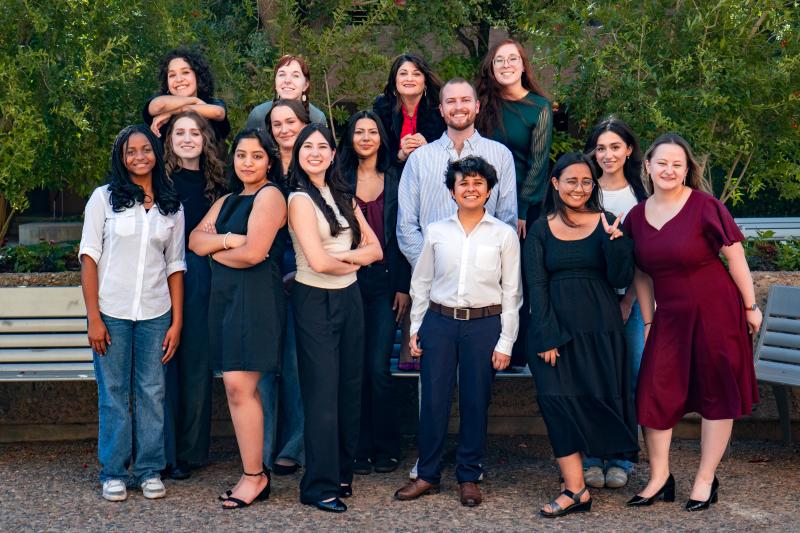
Bimonte-Nelson Lab, 2025
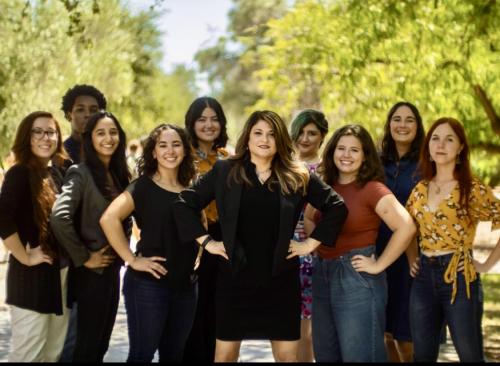
Bimonte-Nelson Lab, 2023
Selected Publications
The list of publications below are just a sample of the work that's being done in our lab. For a complete list of Dr. Bimonte-Nelson's publications, please view her CV.
* denotes graduate student or postdoc in our lab, ^ denotes undergraduate student in our lab
Zhang Z, Scanlan A, Koneru R, Morrell CR, Reece MD, Edwards E, Roa S, Gavegnano C, Bimonte-Nelson H.A., Arbiser J, Tyor W. (2024) Honokiol hexafluoro confers reversal of neuropathological markers of HIV infection in a murine SCID model. Neurotherapeutics. Mar; 21(2): e00329. Published online 2024 Feb 22. doi: 10.1016/j.neurot.2024.e00329 PMCID: PMC10943487.
Simmons A, Mihalek O, Bimonte Nelson HA, Sirianni RW, Stabenfeldt SE. (2024) Acute brain injury and nanomedicine: sex as a biological variable. Front Biomater Sci. 3:1348165. doi: 10.3389/fbiom.2024.1348165. Epub 2024 Feb 2. PMID: 39450372; PMCID: PMC11500709.
Bimonte-Nelson, H.A., *Bernaud, V.E. (2023). How preclinical models of menopause can inform clinical care: A focus on midlife and reciprocal communication between clinical and preclinical science. Current Opinion in Endocrine and Metabolic Research, 28. doi: doi.org/10.1016/j.coemr.2023.100434
*Bernaud V.E., *Koebele S.V., Northup-Smith S.N., Willeman M.N., ^Barker C., ^Schatzki-Lumpkin A., ^Sanchez M.V., Bimonte-Nelson H.A. (2023). Evaluations of memory, anxiety, and the growth factor IGF-1R after post-surgical menopause treatment with a highly selective progestin. Behavioural Brain Research. 448: 114442. PMID 37085118 DOI: 10.1016/j.bbr.2023.114442
*Koebele S.V., *Bernaud V.E., Northup-Smith S.N., Willeman M.N., ^Strouse I.M., ^Bulen H.L., ^Schrier A.R., Newbern J.M., DeNardo D.F., Mayer L.P., Dyer C.A., Bimonte-Nelson H.A. (2023). Gynecological surgery in adulthood imparts cognitive and brain changes in rats: A focus on hysterectomy at short-, moderate-, and long-term intervals after surgery. Hormones and Behavior. 155: 105411. PMID 37659358 DOI: 10.1016/j.yhbeh.2023.105411
Kling JM, Dowling NM, Bimonte-Nelson H, Gleason CE, Kantarci K, Stonnington CM, Harman SM, Naftolin F, Pal L, Cedars M, Manson JE, James TT, Brinton EA, Miller VM. (2023) Associations between pituitary-ovarian hormones and cognition in recently menopausal women independent of type of hormone therapy. Maturitas. 167:113-122. doi: 10.1016/j.maturitas.2022.10.002. PMID: 36395695; PMCID: PMC10077876.
*Bernaud, V. E., ^Bulen, H. L., *Peña, V. L., *Koebele, S. V., Northup-Smith, S. N., ^Manzo, A. A., ^Valenzuela Sanchez, M., ^Opachich, Z., Ruhland, A. M., & Bimonte-Nelson, H. A. (2022). Task-dependent learning and memory deficits in the TgF344-AD rat model of Alzheimer's disease: three key timepoints through middle-age in females. Sci Rep, 12(1). PMCID: PMC9418316
Maher, E. E., Kipp, Z.A., Leyrer-Jackson, J.M., Khatri, S., Bondy, E., Martinez, G.J., Beckmann, J.S., Hinds, Jr., T.D., Bimonte-Nelson, H.A., Gipson, C.D. (2022). Ovarian Hormones Regulate Nicotine Consumption and Accumbens Glutamatergic Plasticity in Female Rats. eNeuro, 9(3). PMCID: PMC9239849
*Koebele, S. V., ^Poisson, M. L., ^Palmer, J. M., ^Berns-Leone, C., Northup-Smith, S. N., *Peña, V. L., ^Strouse, I. M., ^Bulen, H. L., ^Patel, S., ^Croft, C., Bimonte-Nelson, H. A. (2022). Evaluating the Cognitive Impacts of Drospirenone, a Spironolactone-Derived Progestin, Independently and in Combination With Ethinyl Estradiol in Ovariectomized Adult Rats. Front Neurosci, 16. PMCID: PMC9177129
Zeibich, L., *Koebele, S. V., *Bernaud, V. E., Ilhan, Z. E., Dirks, B., Northup-Smith, S. N., ^Neeley, R., Maldonado, J., Nirmalkar, K., Files, J. A., Mayer, A. P., Bimonte-Nelson, H. A., Krajmalnik-Brown, R. (2021). Surgical Menopause and Estrogen Therapy Modulate the Gut Microbiota, Obesity Markers, and Spatial Memory in Rats. Front Cell Infect Microbiol, 11. PMCID: PMC8515187
Stonebarger, G. A., Bimonte-Nelson, H. A., Urbanski, H. F. (2021). The Rhesus Macaque as a Translational Model for Neurodegeneration and Alzheimer's Disease. Front Aging Neurosci, 13. PMCID: PMC8446616
*Koebele, S. V., *Hiroi, R., ^Plumley, Z., ^Melikian, R., *Prakapenka, A. V., ^Patel, S., ^Carson, C., ^Kirby, D., *Mennenga, S. E., Mayer, L. P., Dyer, C. A., Bimonte-Nelson, H. A. (2021). Clinically Used Hormone Formulations Differentially Impact Memory, Anxiety-Like, and Depressive-Like Behaviors in a Rat Model of Transitional Menopause. Front Behav Neurosci, 15. PMCID: PMC8335488
Bimonte-Nelson, H.A., *Bernaud, V.E., *Koebele, S.V. (2021). Menopause, hormone therapy and cognition: maximizing translation from preclinical research. Climacteric. PMCID: PMC9124656
Gipson, C. D., Bimonte-Nelson, H. A. (2021). Interactions between reproductive transitions during aging and addiction: promoting translational crosstalk between different fields of research. Behav Pharmacol, 32. PMCID: PMC7965232
*Bernaud, V.E., *Hiroi, R., ^Poisson, M.L., *Castaneda, A.J., Kirshner, Z.Z., Gibbs, R.B., Bimonte-Nelson, H.A. (2021). Age impacts the burden that reference memory imparts on an increasing working memory load and modifies relationships with cholinergic activity. Front Behav Neurosci, 15. PMCID: PMC7902531
*Prakapenka, A.V., ^Quihuis, A.M., ^Carson, C.G., ^Patel, S., Bimonte-Nelson, H.A., Sirianni, R.W. (2020). Poly(lactic-co-glycolic acid) nanoparticle encapsulated 17β-estradiol improves spatial memory and increases uterine stimulation in middle-aged ovariectomized rats. Front Behav Neurosci, 14. PMCID: PMC7793758
*Koebele, S.V., *Mennenga, S.E., ^Poisson, M.L., ^Hewitt, L.T., ^Patel, S., Mayer, L.P., Dyer, C.A., Bimonte-Nelson, H.A. (2020). Characterizing the effects of tonic 17β-estradiol administration on spatial learning and memory in the follicle-deplete middle-aged female rat. Horm Behav, 126. PMCID: PMC8032560
*Prakapenka, A.V., *Peña, V.L., ^Strouse, I., Northup-Smith, S., Schrier, A., ^Ahmed, K., Bimonte-Nelson, H.A., Sirianni, R.W. (2020). Intranasal 17β-estradiol modulates spatial learning and memory in a rat model of surgical menopause. Pharmaceutics, 12(12). PMCID: PMC7766209
*Koebele, S.V., Nishimura, K.J., Bimonte-Nelson, H.A., Kemmou, S., Ortiz, J.B., Judd, J.M., Conrad, C.D. (2019). A long-term cyclic plus tonic regimen of 17β-estradiol improves the ability to handle a high spatial working memory load in ovariectomized middle-aged female rats. Hormones and Behavior, 118. PMCID: PMC7286486
Holter, M.C., Hewitt, L.T., *Koebele, S.V., Judd, J.M., Xing, L., Bimonte-Nelson, H.A., Conrad, C.D., Araki, T., Neel, B,G., Snider, W.D., Newbern, J.M. (2019) The Noonan Syndrome-linked Raf1L613V mutation drives increased glial number in the mouse cortex and enhanced learning. PLoS Genet. 15(4). doi: 10.1371/journal.pgen.1008108. PMCID: PMC6502435
Goenaga, J., Powell, G.L., Leyrer-Jackson, J.M., Piña, J., Phan, S., *Prakapenka, A.V., *Koebele, S.V., Namba, M.D., McClure, E.A., Bimonte-Nelson, H.A., Gipson, C.D. (2019). N-acetylcysteine yields sex-specific efficacy for cue-induced reinstatement of nicotine seeking. Addict Biol. doi: 10.1111/adb.12711. PMCID: PMC6685767
*Koebele S.V., ^Palmer J.M., ^Hadder B., ^Melikian R., ^Fox C., ^Strouse I.M., DeNardo D.F., George C., Daunis E., Nimer A., Mayer L.P., Dyer C.A., Bimonte-Nelson H.A. (2019). Hysterectomy uniquely impacts spatial memory in a rat model: a role for the nonpregnant uterus in cognitive processes. Endocrinology. 160(1):1-19. doi: 10.1210/en.2018-00709. PMCID: PMC6293088
*Prakapenka, Alesia V., and Heather A. Bimonte-Nelson (2018). Memory and Menopause: An Unsolved Puzzle. Aging 10: 2541-543. PMCID: PMC6224240
Rajeth K., Bimonte-Nelson H.A., Ciavatta V., Haile W., Elmore K., Ward J., Maroun L., Tyor W.R. (2018). Reversing interferon-alpha neurotoxicity in a HIV-associated neurocognitive disorder mouse model. AIDS. 32:1403-11. doi: 10.1097/QAD.0000000000001836
Tyor W.R., Bimonte-Nelson H.A. (2018) A mouse model of HIV-associated neurocognitive disorders: a brain-behavior approach to discover disease mechanisms and novel treatments. J Neurovirol. 24(2): 180-4. PMCID: PMC5845816
*Prakapenka A.V., *Hiroi R., ^Quihuis A.M., ^Carson C., ^Patel S., ^Berns-Leone C., ^Fox C., Sirianni R.W., Bimonte-Nelson H.A. (2018) Contrasting effects of individual versus combined estrogen and progestogen regimens as working memory load increases in middle-aged ovariectomized rats: one plus one does not equal two. Neurobiol. Aging. 64:1-14. doi: 10.1016/j.neurobiolaging.2017.11.015. PMCID: PMC5820186
*Willeman M.N., *Mennenga S.E., Siniard, A.L., Corneveaux, J., De Both M., ^Hewitt L.T., Tsang, C.W.S., Caselli J., *Braden B.B., Bimonte-Nelson H.A., Huentelman J. (2018). The PKC-ß selective inhibitor, Enzastaurin, impairs memory in middle-aged rats. PloS One. 13(6). doi: 10.1371/journal.pone.0198256. PMCID: PMC5988320
*Koebele S.V., *Mennenga S.E., *Hiroi R., ^Quihuis A.M., ^Hewitt L.T., ^Poisson M.L., George C., Mayer L.P., Dyer C.A., Aiken L.S., Demers L.M., ^Carson C., Bimonte-Nelson H.A. (2017) Cognitive changes across the menopause transition: A longitudinal evaluation of the impact of age and ovarian status on spatial memory. Hormones and Behavior, 87, 96-114. PMCID: PMC5479707
*Koebele S.V., *Mennenga S.E., ^Patel, S., *Hiroi R., Hewitt, L.T., ^Quihuis A.M., Mayer L.P., Dyer C.A., Demers L.M., Bimonte-Nelson H.A. (2017). Menopause and the aging brain: Evaluating relationships between circulating ovarian hormone levels and choline acetyltransferase-containing neurons in the basal forebrain. Experimental Gerontology, 94, 111-112. doi: 10.1016/j.exger.2017.02.021
*Koebele, S.V. & Bimonte-Nelson, H.A. (2017). The endocrine-brain-aging triad where many paths meet: Female reproductive hormone changes at midlife and their influence on circuits important for learning and memory. Experimental Gerontology, 94, 14–23. PMCID: PMC5479709
*Prakapenka, A.V., Bimonte-Nelson, H.A., & Sirianni, R. (2017). Engineering poly(lactic- co –glycolic acid) (PLGA) micro- and nano- carriers for controlled delivery of 17beta-estradiol. Annals of Biomedical Engineering, 45, 1697-1709. PMCID: PMC5599155
*Koebele S.V., Bimonte-Nelson H.A. (2016) Modeling menopause: The utility of rodents in translational behavioral endocrinology research. Maturitas, 87, 5-17. PMCID: PMC4829404
*Hiroi R., Carbone D.L., Zuloaga D.G., Bimonte-Nelson H.A., and Handa R.J. (2016) Sex-dependent programming effects of prenatal glucocorticoid treatment on the developing serotonin system and stress-related behaviors in adulthood. Neuroscience, 320, 43-56. PMCID: PMC4840233
*Braden B.B., ^Andrews M.G., *Acosta JI, *Mennenga S.E., ^Lavery C., Bimonte-Nelson H.A. (2016) A comparison of progestins within three classes: Differential effects on learning and memory in the aging surgically menopausal rat. Behavioral Brain Research, 30, 258-268. PMCID: PMC5195920
*Braden B.B., Dassel KB, Bimonte-Nelson H.A., O'Rourke H.P., Connor D.J., Moorhous S., Sabbagh M.N., Caselli R.J., Baxter L.C. (2016) Sex and post-menopause hormone therapy effects on hippocampal volume and verbal memory. Neuropsychology, Development, and Cognition (Section B: Aging, Neuropsychology, and Cognition), 4, 1-20. PMCID: PMC5963938
*Hiroi R., ^Weyrich G., *Koebele S.V., *Mennenga S.E., *Talboom J.S., ^Hewitt L.T., ^Lavery C.N., ^Mendoza P., ^Jordan A., Bimonte-Nelson HA. (2016) Benefits of hormone therapy estrogens depend on estrogen type: 17β-estradiol and conjugated equine estrogens have differential effects on cognitive, anxiety-like, and depressive-like behaviors and increase tryptophan hydroxylase-2 mRNA levels in dorsal raphe nucleus subregions. Frontiers in Neuroscience, 10, 510-517. PMCID: PMC5143618
*Mennenga, S.E., ^Gerson J.E., Dunckley T., Bimonte-Nelson H.A. (2015) Harmine treatment enhances short-term memory in old rats: Dissociation of cognition and the ability to perform the procedural requirements of maze testing. Physiology & Behavior, 138, 260-265. PMCID: PMC4406242
*Braden B.B., ^Kingston M.L., Koenig E.N., ^Lavery C.N., ^Tsang C.W., Bimonte-Nelson H.A. (2015) The GABAA antagonist bicuculline attenuates progesterone-induced memory impairments in middle-aged ovariectomized rats. Frontiers in Aging Neuroscience 7:149. PMCID: PMC4536389
*Mennenga S.E., ^Gerson J.E., *Koebele S.V., ^Kingston M.L., ^Tsang C.W., *Engler-Chiurazzi E.B., Baxter L.C., Bimonte-Nelson H.A. (2015) Understanding the cognitive impact of the contraceptive estrogen Ethinyl Estradiol: tonic and cyclic administration impairs memory, and performance correlates with basal forebrain cholinergic system integrity. Psychoneuroendocrinology. 54:1-13. PMCID: PMC4433884
Prokai L., Nguyen V., Szarka S., Garg P., Sabnis G., Bimonte-Nelson H.A., McLaughlin K.J., *Talboom J.S., Conrad C.D., Shughrue P.J., Gould T.D., Brodie A., Merchenthaler I., Koulen P., Prokai-Tatrai K. (2015) The prodrug DHED selectively delivers 17β-estradiol to the brain for treating estrogen-responsive disorders. Science Translational Medicine. 7(297):113. PMCID: PMC4591937
Wallace E., Kim do Y., Kim K.M., Chen S., *Braden B.B., Williams J., Jasso K., ^Garcia A., Rho J.M., Bimonte-Nelson H., Maganti R. (2015) Differential effects of duration of sleep fragmentation on spatial learning and synaptic plasticity in pubertal mice. Brain Research. 1615:116-28. doi: 10.1016/j.brainres.2015.04.037
*Koebele S.V., Bimonte-Nelson H.A. (2015) Trajectories and phenotypes with estrogen exposures across the lifespan: What does Goldilocks have to do with it? Hormones and Behavior. 74:86-104. PMCID: PMC4829405
*Mennenga S.E., Baxter L.C., ^Grunfeld I.S., Brewer G.A., Aiken L.S., *Engler-Chiurazzi E.B., *Camp B.W., *Acosta J.I., *Braden B.B., ^Schaefer K.R., ^Gerson J.E., ^Lavery C.N., ^Tsang C.W., ^Hewitt L.T., ^Kingston M.L., *Koebele S.V., Patten K.J., Ball B.H., McBeath M.K. Bimonte-Nelson H.A. (2014) Navigating to new frontiers in behavioral neuroscience: traditional neuropsychological tests predict human performance on a rodent-inspired radial-arm maze. Frontiers in Behavioral Neuroscience, 8. PMCID: PMC4158810
*Mennenga S.E., *Koebele S.V., ^Mousa A.A., ^Alderete T.J., ^Tsang C.W., *Acosta J.I., *Camp B.W., Demers L.M., Bimonte-Nelson H.A. (2014) Pharmacological blockade of the aromatase enzyme, but not the androgen receptor, reverses androstenedione-induced cognitive impairments in young surgically menopausal rats. Steroids. PMCID: PMC4398574
*Talboom J.S., West S.G., *Engler-Chiurazzi E.B., Enders C.K., ^Crain I., Bimonte-Nelson H.A. (2014) Learning to remember: cognitive training-induced attenuation of age-related memory decline depends on sex and cognitive demand, and can transfer to untrained cognitive domains. Neurobiology of Aging, 35(12), 2791-2802. PMCID: PMC4252709
*Acosta J., *Hiroi R., *Camp B., *Talboom J., Bimonte-Nelson H.A. (2013) An update on the cognitive impact of clinically-used hormone therapies in the female rat: models, mazes, and mechanisms. Brain Research, Special Issue on Window of Opportunity for Hormone Therapy, 1514: 18-39. PMCID: PMC3739440
*Mennenga S., Bimonte-Nelson H.A. (2013) Translational cognitive endocrinology: Designing rodent experiments with the goal to ultimately enhance cognitive health in women. Brain Research, Special Issue on Window of Opportunity for Hormone Therapy, 1514: 50-62. PMCID: PMC3936018
Singh M., Simpkins J.W., Bimonte-Nelson H.A., Brinton R.D. (2013) Window of opportunity for estrogen and progestin intervention in brain aging and Alzheimer's disease. Brain Research, Special Issue on Window of Opportunity for Hormone Therapy, 1514:1-2. PMCID: PMC4076427
Rao V.R., Neogi U., *Talboom J.S., Padilla L., Rahman M., Fritz-French C., Gonzalez-Ramirez S., Verma A., Wood C., Ruprecht R.M., Ranga U., Azim T., Joska J., Eugenin E., Shet A., Bimonte-Nelson H.A., Tyor W.R., Prasad V.R. (2013) Clade C HIV-1 isolates circulating in Southern Africa exhibit a greater frequency of dicysteine motif-containing Tat variants than those in Southeast Asia and cause increased neurovirulence. Retrovirology, 10:61. PMCID: PMC3686704
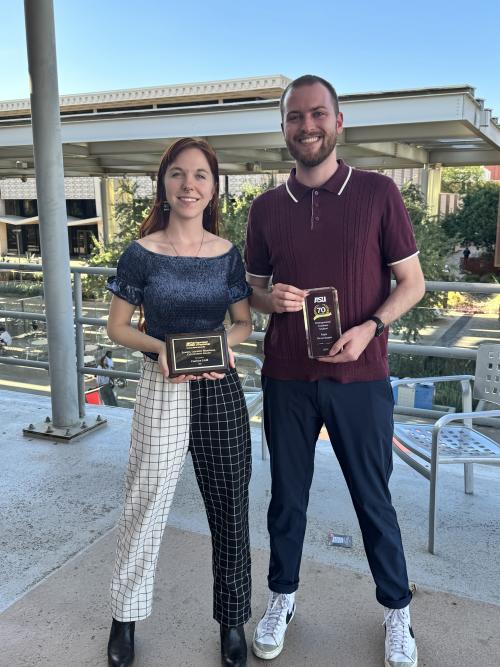
Lab News & Highlights:
Graduate student Camryn Lizik won the Sameul Leifheit Service Award for 2025. Congratulations, Camryn!
Graduate student Matt Oevermann received the 2025 Faculty Women's Association Distinguished Graduate Student Award. Well deserved, Matt- congratulations!
Our undergraduate honors student Emma Oyen was nominated for top three honors thesis in Psychology! 2024
Our undergraduate honors student Sadaf Asadifar won the Barrett Honors College Outstanding Graduate, and gave an excellent speech at convocation! 2024
Our undergraduate student, Megan Nelson, co-mentored with Dr. Jessica Verpeut, was the CLAS Dean's Medalist for graduation, 2024!
Dr. Bimonte-Nelson was invited to the Arizona Teachers of Psychology Conference, and presented: "Hormone Exposures Throughout Life Impact the Brain and Memory in Females: Experimental Evidence from Multiple Domains of Cognition,” at the Theme: ”The Science of Psychology.” 2024
Dr. Bimonte-Nelson was part of the Meet the Expert series at Syracuse University, and gave an invited talk for the Theme: The Overrepresented but Understudied in AD. 2024
Dr. Bimonte-Nelson was an Invited Speaker at the National Hispanic Science Network Scientific Session: How Sex and Gender Impact Latina Health, Louisiana State University Health Sciences Center, Human Development Center. Her talk was entitled, “Overturning Dogma to Break Barriers in Women’s Health Research: The Ovary-Uterus-Brain Connection Impacts Memory Across the Lifespan.” 2024
Jade Pastor won a travel award to present posters at the 2023 Emerging Researchers National (ERN) Conference in STEM in Washington D.C. next February.
Dr. Bimonte-Nelson was an Invited Speaker at Harvard Medical School, Brigham and Women’s Hospital, Harvard Reproductive Outcomes of Stress and Aging Center (ROSA). She gave a talk entitled: “Variations in Menopause Type and Hormone Exposures Throughout Life Impact Memory: Embracing Complexity, Overturning Dogma, and Diving Deep into Uncharted Waters.” 2023.
Dr. Bimonte-Nelson was an Invited Speaker at University of Toronto, Women’s Brain Health Grand Rounds. She gave talk entitled: “Mapping and modeling menopause: Variations in menopause type and hormone exposures across the lifetime impact the brain and cognition” and was part of a follow up panel for discussion on brain health in women. This was a special forum combining clinical brain scientists and basic scientists in the audience, all interested in women's brain health, to enrich collaboration and translation. 2023.
Dr. Bimonte-Nelson was featured in a Hello Uterus Podcast series: “EPISODE SUMMARY: In this special 2-part episode, we are joined by Professor Heather Bimonte-Nelson, PhD, to debunk the myth that the uterus is a "useless" organ when in its non-pregnant state, and therefore disposable if one is not seeking to conceive.”
Veronica Pena successfully defended her PhD on April 26th, 2023! CONGRATULATIONS DR. PENA!
Victoria Bernaud successfully defended her PhD on September 13th, 2022! CONGRATULATIONS DR. BERNAUD!
Dr. Heather Bimonte-Nelson hosted several annual cohorts of ADRC Junior Fellows from local high schools at the ASU Psychology Department from 2022-2025 to provide the students with experience in a research laboratory setting and to teach them about Alzheimer’s disease, neuroscience, and brain aging, followed by the AAC Scientific Conference event!
Dr. Heather Bimonte-Nelson was awarded one of the university's most prestigious faculty honors, the designation as President's Professor! She is one of only 40 ASU professors to ever receive this award. As a recipient, she is recognized for her "enthusiasm and innovation in teaching, the ability to inspire original and creative work by students, mastery of subject matter and scholarly contributions."
Victoria Bernaud received the Sharon Manne Graduate Student Research Award! This award provides funds to PhD students who are conducting research in the fields of clinical and health psychology and behavioral neuroscience that aims to address mental and physical health issues.
Haidyn Bulen received a Fulbright award to conduct research in Australia for three years
Stephanie Koebele won the Federation of Associations in Behavioral and Brain Sciences (FABBS) Doctoral Dissertation Research Excellence Award! More information can be found here.
Haidyn Bulen defended her honors thesis and received Top Honors Thesis in the Psychology Department!
Victoria Woner was awarded the Society for Neuroscience Trainee Professional Development Award (TPDA)! Article can be found here.
Stephanie Koebele successfully defended her PhD on July 8th, 2019!
Isabel Strouse defended her honors thesis and received the 2019 Barrett Award for Outstanding Research, which only two undergraduates in the Barrett Honors program receive each year! She was also awarded the Top Honors Thesis in the Psychology department.
Stephanie Koebele received the 2019 Faculty Women's Association Outstanding Graduate Student Award!
Alesia Prakapenka successfully defended her PhD on October 25th, 2018 and started her Postdoctoral Fellowship at Syracuse University with Dr. Donna Korol.
60 third grade students and 4 teachers from William T. Machan elementary school participated in the 2019 Brain Fair for Children with 10 volunteer instructors from the lab who helped.
Stephanie Koebele did a press release for her publication. More information can be found here.
Haidyn Bulen presented research on sex differences in Alzheimer’s disease. at the ASU-Banner Neuroscience Symposium, hosted by the ASU-Banner Neurodegenerative Disease Research Center. The symposium capped off the Banner-ASU Neuroscience Scholars Program, which is a paid, eight-week research training program available to undergraduate students nationwide.
AZBio named Heather Bimonte-Nelson the 2018 Michael A. Cusanovich Arizona Bioscience Educator of the Year for her commitment to developing the next generation of inquiring minds.
Justin Palmer won "Best Undergraduate Thesis" in the Psychology department for his thesis.
The Bimonte-Nelson lab teamed up with Red Mountain High school for the second consecutive year to teach students about the brain at the 2018 Red Mountain STEM day.
Justin Palmer won the 2017-2018 Federation of Associations in Behavioral and Brain Sciences Undergraduate Research Excellence Award! This award acknowledges and honors undergraduate student investigators who have conducted research of superior quality and with broader societal impact.
75 third grade students and 4 teachers from Creighton elementary school participated in the 2018 Brain Fair for Children with 11 volunteer instructors from the lab who helped.
Alesia Prakapenka won the 2018 Outstanding Graduate Student Award from the Faculty Women’s Association!
Isabel Strouse and Justin Palmer won 1st and 2nd place for their posters at the 2018 Arizona Psychology Undergraduate Research Conference (AZPURC)!
55 third grade students and 4 teachers from Creighton elementary school participated in the 2017 Brain Fair for Children with 11 volunteer instructors from the lab who helped.
About sixty 4th and 5th grade students and two teachers from Kyrene's Monte Vista elementary school participated in the 15 March 2016 Brain Fair organized by Dr. Sheri Hiroi with seven volunteer instructors from the lab who helped. For more pics and info about our Brain Fairs, click here! (posted 5/9/16).
Stephanie Koebele won a competitive scholarship to attend the August 2016 Practical Workshop in Confocal Microscopy and Stereology in Chicago. The purpose of this intensive, week-long workshop is for researchers in biomedical science to learn new cell quantification microscopy techniques including a comprehensive overview in the theory and practice of modern histological preparation and microscopic analysis.
Explore the new book which provides a laboratory roadmap for testing cognition, edited by Heather with stellar contributions from leaders in the field including personal accounts and scientific perspectives of their key discoveries: The Maze Book: Theories, Practice, and Protocols for Testing Rodent Cognition
Doctoral student Stephanie Koebele wins Young Investigator Award at the 10th European Congress on Menopause and Andropause (EMAS). Read more about Stephanie's fabulous achievement!
Read about Brain Fairs for Children, organized by the Bimonte-Nelson lab and attended by hundreds of happy kids!
Doctoral student and lab member Sarah Mennenga earned the Psychology Department scholar award and successfully defended her PhD in 2015.
Bimonte-Nelson Lab graduate student Alesia Prakapenka won an NSF award co-mentored by Dr. Heather Bimonte-Nelson and Dr. Rachael Sirianni at Barrow Neurological Institute, entitled "Development of targeted delivery of estrogen to examine its effect on cognitive function."
Bimonte-Nelson Lab Dinner, Society for Neuroscience 2013 in San Diego.
Nobel Laureate Dr. Eric Kandel visiting the lab at ASU in 2012.
Contact Us
To apply, please email principal investigator President's Professor Dr. Bimonte-Nelson and contact the laboratory manager Rhys Doyle for the Undergraduate Research Assistant application.
Research Opportunity Description
Dr. Bimonte-Nelson expects the same traits from her research technicians as she does for her graduate students (see above). Potential applicants must also be hardworking and dependable with a BA or BS in psychology or biology. Dr. Bimonte-Nelson asks that applicants be dedicated to this position for at least 4 years (the duration of a grant).
Undergraduate Research Volunteers
We are interested in accepting undergraduates into our laboratory team who have interests in studying the neurobiological and cognitive effects of menopause and aging. Students who are more likely to be considered are Psychology majors, focusing on pursuing a career in neural behavioral research.
Requirements for undergraduate researchers:
Highly responsible
Highly motivated and enthusiastic
Punctual and organized
Can work independently as well as within a group
A year minimum before graduation (training takes time)
Morning availability
